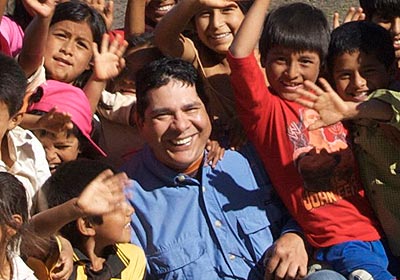 |
| Professor Ivar Mendez with Bolivian children. (Photo courtesy of Ivar Mendez) |
These are the stories that will break your heart: children who are too malnourished to stay awake during class; mothers who donโt get adequate prenatal care because the clinic is a plane-ride away; the 13-year-old girl who died of a toothache when a makeshift remedyโapplying a heated nail to deaden throbbing exposed nervesโwent horribly wrong.
โIt isnโt right for someone to die because of a toothache,โ says Ivar Mendez, professor and head of ะยผำฦยม๙บฯฒสฟชฝฑึฑฒฅโs Division of Neurosurgery and chair of the Brain Repair Centre.
As busy as he is, Dr. Mendez isnโt one to shake his head and shrug his shoulders, wondering what can be done. These days, his work as a respected clinician and scientist often intersects with his humanitarian efforts. Heโs generous to share his knowledge in neurosurgery, medical care and techniquesโnot to mention equipmentโwith doctors in Rwanda, Bolivia, China, Cuba and parts of Canada too. Heโs pioneering the use of a remote-presence robot for medical care in the Inuit community of Nain in northern Labrador.
From Bolivia
โI feel we each have a personal responsibility to narrow the gap of inequality in the world,โ he says, as he shows photographs of three places in particular where heโs directed his efforts: Aucapata, Bolivia; Nain, Newfoundland and Labrador; and Kigali, Rwanda.
โEarly on I made a decision,โ continues Dr. Mendez, who arrived in Toronto as a teenager with his family from Bolivia. โFor every invitation I had to speak at Harvard or any other big centre, I would spend the same amount of time in a Third World country, doing what I can to contribute.โ
Time and again, he returns to Bolivia, his homeland and the second poorest country in the Western hemisphere. Called โthe rooftop of the world,โ the landlocked South America country is breathtakingly beautiful, boasting a diversity of ecosystems, from high mountain ranges to tropical rain forests. Over 60 per cent of Boliviaโs people are indigenous, mostly Quechua or Aymara, eking out a meagre existence through subsistence farming.
On one trip, to Aucapata, an isolated village in the Andes, Dr. Mendez sat in on a class at the local school. He noticed the children were lethargic and could barely stay awake, much less respond to their increasingly frustrated teacher.
โIt was nothing they could control; they just didnโt have enough food,โ he says. As a brain specialist, he realized their hunger was affecting their ability to learn and retain knowledge. The solution was obvious and he immediately set about putting a school breakfast program in place using his own money.
Six years ago, the program was launched to provide a nutritious breakfastโmilk, oatmeal, bread and fruitโfor 60 children. Today, the program feeds 5,000 children in 24 schools. Thereโs been a jump in attendance at the schools for boys and girls, improved grades and more participation among the kids. Itโs been easier to recruit teachers too, he notes.
Dental care
It was afterwards that Dr. Mendez heard the story of the girl and her fatal toothache. That spurred a program of dental hygiene for the children, who werenโt brushing their teeth and had mouthfuls of cavities as a result. Theyโve since got into the habit of washing their hands before breakfast and brushing their teeth afterwards. As well, Dr. Mendez hired a dentist and brought in modern dental equipment and a generator. Within three months of the dentistโs arrival, she attended to almost 900 patients who hadnโt been to a dentist before.
Next, he decided to focus on those young minds, now eager to learn. He supplied the children with sturdy computers that can be hand cranked in areas where there is no electricity.
โThe idea is that these children donโt need to speak the same language for some subjects, like math, art and music. But perhaps the girl in Halifax and the Inuit child in Labrador and the boy in Bolivia can get together to work on a musical composition. Itโs been very exciting to see what theyโve come up with.โ
Dr. Mendezโs humanitarian work is being recognized with a 2010 Humanitarian Award by the Canadian Red Cross, the same award given to ะยผำฦยม๙บฯฒสฟชฝฑึฑฒฅ Chancellor Fred Fountain last year. The awards dinner takes place Wednesday, November 10 at 6:30 p.m. Logan MacGillivray, the 13-year-old founder of Listen to the Children, will also be honoured. For more information or to purchase tickets, please call 424-1427.
โMaking a difference to children really matters,โ says Dr. Mendez. โThey are the going to be the leaders of the future. They are the ones who will improve their own countries and propel them forward.โ
MORE PHOTOS: See photos of Dr. Mendez's humanitarian work in Bolivia.
